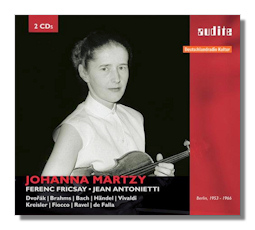
The Internet's Premier Classical Music Source
Related Links
-
Bach Reviews
Brahms Reviews
Dvořák Reviews
Falla Reviews
Handel Reviews
Kreisler Reviews
Ravel Reviews
Vivaldi Reviews - Latest Reviews
- More Reviews
-
By Composer
-
Collections
DVD & Blu-ray
Books
Concert Reviews
Articles/Interviews
Software
Audio
Search Amazon
Recommended Links
Site News
 CD Review
CD Review
Johanna Martzy

Berlin 1953-1966
- Antonín Dvořák: Concerto for Violin in A minor, Op. 53 **
- Johannes Brahms:
- Sonata for Violin #1 in G Major, Op. 78 *
- Johann Sebastian Bach:
- Sonata for Violin in G minor, BWV 1001
- Georg Frideric Handel:
- Sonata for Violin in A Major, Op. 1, #3 *
- Antonio Vivaldi: Sonata for Violin in D Major, RV 10 *
- Fritz Kreisler: Rondo on a Theme by Beethoven *
- Joseph-Hector Fiocco: Suite #1 in G Major (Allegro) *
- Maurice Ravel: Berceuse sur le nom de Gabriel Fauré *
- Manuel de Falla: La vida breve (Danse Espagnole) *
Johanna Martzy, violin
* Jean Antonietti, piano
** RIAS Symphony Orchestra/Ferenc Fricsay
Audite Portrait 23.424 2CDs 1:45:01
The name Johanna Martzy is only remembered among violinists and hardcore collectors. Although she had a promising career, she was derailed by personal – and at the time, unacceptable – illnesses, eventually succumbing to cancer at a reasonably young age. She also had difficult relationships with both conductors and producers, and those she ran afoul of were very influential names in the industry. Her recorded legacy is understandably small given all that, but recent historical issues from labels big and small have started to revive interest in her career.
I imagine that most collectors will primarily be interested in the Dvořák. This is not her studio version for Deutsche Grammophon with the same conductor and orchestra, but rather a live broadcast captured just before the official recording. RIAS regulations apparently dictated that these broadcasts occur, and it happened that this was a planned collaboration. Such events rarely line up this way, even in classical music. The DG disc is rather hard to find; this is a very good interpretation captured in decent sound. Fricsay was another short-lived legend lost to cancer, and nearly all of his remaining recordings are worth hearing. The concerto sounds terrific. Martzy isn't Suk or Oistrakh, but she's excellently supported by the radio orchestra and sings sweetly throughout.
The rest of the program is a worthy selection of violin sonatas and short pieces. It makes a good deal of sense to couple the concerto with Brahms, and it fills disc one intelligently. The Violin Sonata #1 is given a good reading. Martzy has a few very noticeable intonation problems here and there, but otherwise she plays with strength and poetry. And pianist Jean Antonietti does more than just sit there, even if the early (and probably monophonic) sound favors the violinist. Speaking of the sound, it's not marked stereo or mono, which is irritating when the chamber recordings range from 1962-1966 (the 1953 concerto is obviously monaural). I don't like playing guessing games as a consumer, especially when it comes to live radio broadcasts.
The Bach is also an important document. Martzy's Bach is well-regarded, and last appeared in the unusual joint EMI/Deutsche Grammophon Martzy box. Before that, the Bach Sonatas and Partitas were on Testament. Audite fails to mention this is a solo selection, but it's quite beautiful and is convincing in the old-fashioned tradition. Sonatas by Handel and Vivaldi are less important, but no less traditional in approach. Jean Antonietti keeps his accompaniments suitably bouncy and elegant, though he's again fairly far back in the mix and it's hard to tell what kind of pianist he actually was. The Vivaldi Sonata is arranged for violin and piano by Ottorino Respighi (yes, that one), and my research shows that this is more of a realization and possibly reconstruction than anything else. Audite gives both composers equal credit. That's odd, considering that the arrangements of the Fiocco (Bent O'Neill) and Falla (Fritz Kreisler) are simply treated like arrangements, with absolutely no info on O'Neill at all. I have chosen to follow the booklet and give Respighi full credit. The short pieces are basically encores, and are as charming as they are irrelevant compared to the larger works. Musically, this is a real winner, but in terms of presentation and accessibility, it's sloppy even for a German import product.
Copyright © 2015, Brian Wigman





















